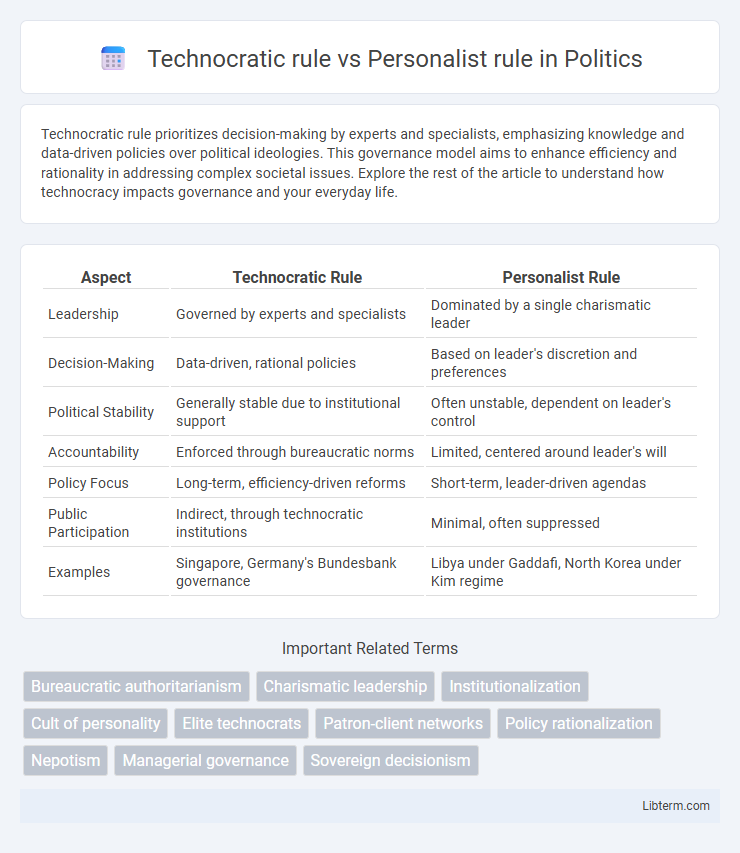Technocratic rule prioritizes decision-making by experts and specialists, emphasizing knowledge and data-driven policies over political ideologies. This governance model aims to enhance efficiency and rationality in addressing complex societal issues. Explore the rest of the article to understand how technocracy impacts governance and your everyday life.
Table of Comparison
| Aspect | Technocratic Rule | Personalist Rule |
|---|---|---|
| Leadership | Governed by experts and specialists | Dominated by a single charismatic leader |
| Decision-Making | Data-driven, rational policies | Based on leader's discretion and preferences |
| Political Stability | Generally stable due to institutional support | Often unstable, dependent on leader's control |
| Accountability | Enforced through bureaucratic norms | Limited, centered around leader's will |
| Policy Focus | Long-term, efficiency-driven reforms | Short-term, leader-driven agendas |
| Public Participation | Indirect, through technocratic institutions | Minimal, often suppressed |
| Examples | Singapore, Germany's Bundesbank governance | Libya under Gaddafi, North Korea under Kim regime |
Defining Technocratic Rule: Governance by Experts
Technocratic rule emphasizes governance by experts who rely on specialized knowledge, technical skills, and empirical data to make policy decisions, contrasting sharply with personalist rule that centers power around a single leader. This form of governance prioritizes rationality, efficiency, and evidence-based approaches, often involving professionals from fields like economics, engineering, and public administration. Technocrats operate within institutional frameworks and often advocate for depoliticized decision-making to address complex societal challenges objectively.
Understanding Personalist Rule: Governance by Individuals
Personalist rule centers on governance dominated by a single individual whose authority often bypasses institutional checks and balances, leading to highly centralized decision-making. This form of rule typically depends on personal loyalty, patronage networks, and charisma, contrasting sharply with technocratic rule, which relies on expertise, formal institutions, and bureaucratic processes. Understanding personalist governance involves analyzing how personal control affects policy outcomes, state capacity, and political stability in regimes where institutionalized power is weak or absent.
Historical Evolution of Technocratic and Personalist Regimes
Technocratic regimes historically emerged in industrialized nations emphasizing expertise, meritocracy, and bureaucracy during periods of modernization, notably in mid-20th century Europe and Latin America. Personalist regimes evolved from traditional authoritarian systems where power consolidated around a single leader, characterized by patronage networks and charisma, prominently visible in 20th-century Africa and Asia. Over time, technocratic governance adapted to global economic integration, while personalist rule often persisted through personalized control over state institutions and limited political pluralism.
Key Characteristics of Technocratic Leadership
Technocratic leadership emphasizes expertise, data-driven decision-making, and prioritizing efficiency over political ideology, often relying on specialists and professionals in governance roles. This rule is characterized by rational problem-solving, technocracy-based policy implementation, and minimized influence of populism or charismatic authority. Technocratic regimes typically value meritocracy and institutional frameworks that promote objective analysis to address complex socio-economic challenges.
Traits of Personalist Political Systems
Personalist political systems centralize power around a single leader, often characterized by authoritarianism, limited institutional constraints, and personalized loyalist networks rather than formal bureaucracies. This governance style undermines legal-rational authority, fostering political instability through unpredictability and nepotism. Personalist regimes frequently rely on patronage and repression to maintain control, contrasting with technocratic rule's emphasis on expertise and institutional decision-making.
Decision-Making Processes: Expertise vs. Authority
Technocratic rule centers decision-making on specialized knowledge and expert analysis, ensuring policies are grounded in empirical data and technical proficiency. Personalist rule relies heavily on the authority and discretion of a single leader, often sidelining institutional checks and expert input. The contrast highlights a preference for systematic, evidence-based governance versus centralized, charismatic control in political authority.
Societal Outcomes: Stability, Growth, and Public Trust
Technocratic rule often fosters societal stability and economic growth by emphasizing expertise-driven policies and evidence-based decision-making, which can enhance public trust through perceived efficiency and competence. In contrast, personalist rule frequently leads to volatile stability and uneven growth due to centralized power and decision-making based on individual interests, often eroding public trust as governance appears arbitrary or self-serving. Empirical studies show that countries with technocratic governance tend to experience higher institutional trust and more consistent development outcomes compared to those under personalist regimes, where unpredictability and favoritism undermine long-term progress.
Case Studies: Technocratic vs. Personalist Governments
Technocratic rule prioritizes expertise and institutional governance, as seen in Singapore's government, where policy decisions are driven by skilled technocrats ensuring economic growth and stability. In contrast, personalist rule centers power around a single leader, exemplified by Zimbabwe under Robert Mugabe, where authority is maintained through patronage and repression, often leading to institutional decay. Case studies reveal that technocratic governments tend to foster sustainable development, whereas personalist regimes are prone to instability and corruption.
Challenges and Criticisms of Both Systems
Technocratic rule faces challenges such as limited political accountability and potential disconnect from public interests due to its reliance on experts rather than elected representatives. Personalist rule is criticized for concentrating power in a single leader, leading to authoritarianism, corruption, and lack of institutional checks and balances. Both systems struggle with legitimacy issues, as technocracy can be perceived as elitist while personalism often undermines democratic governance.
Future Trends: Hybrid Models and Global Implications
Emerging future trends indicate a rise in hybrid governance models that blend technocratic rule's data-driven decision-making with personalist rule's centralized authority, aiming to balance efficiency and control. These hybrid systems leverage advanced technologies such as AI and big data to enhance bureaucratic functions while maintaining strong leadership charisma, influencing global political stability and policymaking dynamics. The global implications include shifts toward more adaptive and resilient governance structures capable of addressing complex transnational challenges like climate change and cyber threats.
Technocratic rule Infographic

 libterm.com
libterm.com